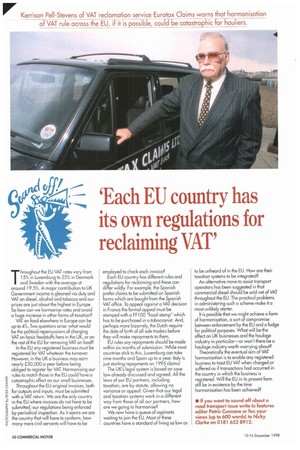'Each EU country has its own regulations for reclaiming VAT'
Page 52

If you've noticed an error in this article please click here to report it so we can fix it.
Throughout the EU VAT rates vary from 15% in Luxemburg to 25% in Denmark and Sweden with the average at around 19.5%. A major contribution to UK Government income is gleaned via duty and VAT on diesel, alcohol and tobacco and our prices are just about the highest in Europe. So how can we harmonise rates and avoid a huge increase in other forms of taxation?
VAT on food elsewhere in Europe can be up to 4%. Two questions arise: what would be the political repercussions of charging VAT on basic foodstuffs here in the UK, or on the rest of the EU for removing VAT on food? In the EU any registered business must be registered for VAT whatever the turnover. However, in the UK a business may earn nearly £50,000 a year before being obliged to register for VAT. Harmonising our rules to match those in the EU could have a catastrophic effect on our small businesses. Throughout the EU original invoices, both for outputs and inputs, must be submitted with a VAT return. We are the only country in the EU where invoices do not have to be submitted; our regulations being enforced by periodical inspection. As it seems we are the country that will have to conform, how many more civil servants will have to be employed to check each invoice? Each EU country has different rules and regulations for reclaiming and these can differ wildly. For example, the Spanish prefer claims to be submitted on Spanish forms which are bought from the Spanish VAT office. To appeal against a VAT decision in France the formal appeal must be stamped with a FF100 "fiscal stamp" which has to be purchased in a tobacconist. And, perhaps more bizarrely, the Dutch require the date of birth of all sole traders before they will make repayments to them. EU rules say repayments should be made within six months of submission. While most countries stick to this, Luxemburg can take nine months and Spain up to a year. Italy is just starting repayments on 1995 claims! The UK's legal system is based on case law already discussed and agreed. All the laws of our EU partners, including taxation, are by statute, allowing no variance or appeal. Given that our legal and taxation systems work in a different way from those of all our partners, how are we going to harmonise? We now have a queue of aspirants waiting to join the EU. Most of these countries have a standard of living so low as to be unheard of in the EU. How are their taxation systems to be integrated? An alternative move to assist transport operators has been suggested in that commercial diesel should be sold net of VAT throughout the EU. The practical problems in administering such a scheme make it a most unlikely starter. It is possible that we might achieve a Form of harmonisation, a sort of compromise between enforcement by the EU and a fudge for political purposes. What will be the effect on UK businesses and the haulage industry in particular—or won't there be a haulage industry worth worrying about? Theoretically the eventual aim of VAT harmonisation is to enable any registered business to treat EU VAT when charged or suffered as if transactions had occurred in the country in which the business is registered. Will the EU in its present form still be in existence by the time harmonisation has been achieved?
• If you want to sound off about a road transport issue write to features editor Patric Cunnane or fax your views (up to 600 words) to Nicky Clarke on 0181 652 8912.












































































































